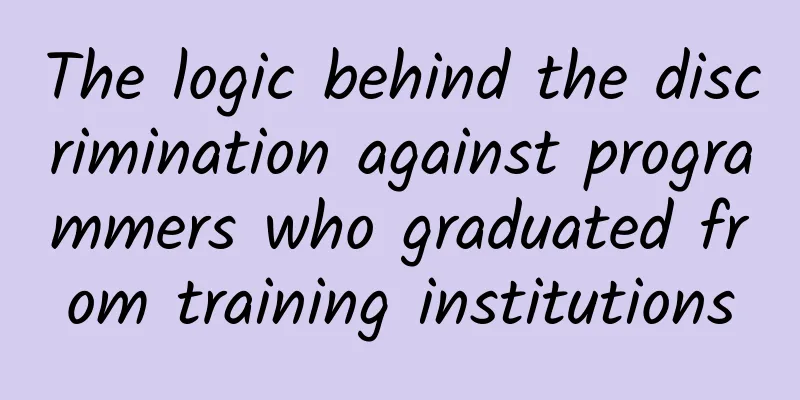The logic behind the discrimination against programmers who graduated from training institutions

|
Nowadays, there are many IT training institutions such as DaNet, Huaqing Yuanjian, Guoqian, Beida Jade Bird, and Chuanchuan Zhike, which provide an opportunity to master new skills for college students who have not yet graduated, college students who cannot find a job after graduation, and re-employed people who want to change careers after work. Through three months, six months, or even longer training, you can master a certain skill, such as Android development, Java Web development, iOS development, embedded Linux development, and then, is that all? Sorry, there is still a "then", but the "then" is not as bright as the sales representatives of training institutions often advertise when they call you. Some institutions will recommend you a job until you are completely disappointed with the company they recommend, and some institutions will let you go out to explore the world and encounter obstacles everywhere... The forms are different, but it is true that a painful journey has begun from then on. Many companies discriminate against graduates from training institutions. Is your company like this? Or have you been looked down upon when looking for a job after graduating from an IT training institution? In order to understand why programmers from IT training institutions often encounter unequal treatment when looking for jobs, we need to understand the difference between "education" and "training". Education and Training Generally speaking, what we call "education" refers to the process of mastering general principles and techniques; and what we call "training" is nothing more than the process of learning a specific skill. The above is what Weinberg said in "Psychology of Program Development", which is consistent with most people's understanding of "education" and "training". You can learn to cut hair, cook, repair cars, write code, and bake cakes through training institutions. This is nothing strange. When we receive training, we go there for a certain skill, right? I went to Lanxiang, didn’t I go there to drive an excavator? We usually think that training institutions (schools) are the cradle for learning some not-so-complex livelihood skills. Another characteristic of this skill is that it is relatively stable, does not change very frequently, and can maintain basic stability for a long period of time. Therefore, once you have acquired this skill, you can make a living from it for a while, maybe one or two years, three or five years, or ten or eight years. As for education, we usually think it is a basic job, which is knowledge-oriented, principle-oriented, long-term, slow to produce results, out of touch with society, and sometimes even makes people stupid (note that I am not satirizing the current education system, nor am I discrediting our great university education). Despite this, many IT companies' basic departments are still occupied by friends who have received formal university education. Because everyone generally believes that although school education is seriously out of touch with social reality, the intelligence level and learning ability of students from prestigious universities are, on average, higher than those of middle school students who failed to enter university, and they are more suitable for technical positions that have some special requirements for intelligence and learning ability. Yes, programmers are such positions. The average intelligence level and learning ability of programmers are higher than most practitioners in other industries. However, the difference between education and training is not the key point. The key point is that for some reason, interviewers or company managers are biased against people who come from "training institutions". To illustrate this point, we first need to look at the special abilities that programmers need. Special skills required by programmers To become a qualified programmer, you need the following "special" abilities:
It doesn't seem to be anything surprising. Maybe you think the most important abilities of a programmer are not the above three. It doesn't matter. Do you know or not, it should be green, fat, red and thin. No matter how you look at it, you can see the mountains from the front and the peaks from the side. There are a thousand Hamlets for a thousand audiences. Well, start the drooling mode... 500 words omitted here... It is generally recognized that programmers are engaged in brain-burning work. The industry is developing rapidly, and various new languages, technologies, frameworks and concepts are emerging in an endless stream. Programmers need to always maintain a zero-based learning mentality and continue to learn to maintain their competitiveness and value. Therefore, I also started from this perspective and chose the three points mentioned above. In fact, these three points point to the "[Way of Learning]". Self-knowledge We must understand what we have and what we lack before we can start learning. By constantly summarizing and reviewing what we have done, we can gradually understand the boundaries of our abilities. What things have been done well, why are they good there and not elsewhere, and which of your behaviors, talents, and abilities have determined it? What things have been done poorly, why are they bad at that point and not at other points, and which of your behaviors or abilities can be improved to change the direction of things, or is there nothing you can change that is your limitation? When you understand yourself, you can find out what you should do and decide the direction of your own study, instead of blindly entrusting yourself to others (schools, teachers, parents, training institutions), because no one can really be responsible for you. The only one who can be responsible for you is yourself. Of course, self-knowledge is the most difficult thing, and it is not something that can be achieved overnight. It requires constant self-reflection and introspection. Self-learning Well-known education expert Ling has two very famous books, "Education is Useless" and "Learning Does Not Need to Be Taught". Ling has a very core point of view: learning ability is an innate ability of human beings, a talent of human beings, and does not need to be taught, but this ability will shrink or disappear with age and the misleading of family education and school education. Therefore, the direction of education is to create an environment for people to discover their own learning ability. The Sixth Patriarch Huineng suddenly realized and passed on the mantle, and the Buddha nature is in everyone's heart. However, there are many people in the world who, like Shenxiu, believe that "the body is a bodhi tree, the mind is like a mirror, always wipe it diligently, and don't let it get dusty." They must rely on external forces and various rules and regulations to keep the mind clear and finally achieve some kind of practice. This kind of saying and practice that distorts the essence of education is popular, resulting in secondary education (universities are relatively free) emphasizing knowledge, rules, and skills, but not discovery, awakening, teaching students in accordance with their aptitude, and teaching without distinction, which ultimately kills students' self-learning ability. Therefore, many people are not born unable to learn, but they slowly lose their self-learning ability in the process of growing up under the various external forces of family, school, and society. What's worse, most people are unaware of the loss of this ability. However, programmers especially need the ability to learn on their own. School will teach you the principles of operating systems, the principles of computer composition, algorithms, C language, Java, and all kinds of knowledge. However, it is still unknown whether you can use the knowledge you have learned to solve problems at work. Training institutions will teach you how to write Java code, how to install a certain IDE, and how to complete a small project like a personal blog or a shopping cart. However, you passively "complete" these things according to the teacher's requirements under the framework. When you are at work, facing huge unknowns and unfamiliar projects, can you apply them flexibly? It is full of unknowns. [It is particularly important for a programmer to be able to learn a skill and solve a problem by himself.] Because, few supervisors will teach you the practical skills of programming and design, and few supervisors will be kind enough to send you to a workshop to learn the skills needed for work. In a real environment, everything depends on you. If you cannot learn a necessary skill independently, no one can help you. If you cannot solve the problem independently, no one can always pull you. This is exactly what Liang Shuming said: "Anyone's academic achievement is the result of self-study. School education only gives students a start, making it easier for them to learn by themselves. Young people should not be discouraged in this regard." Many people look down on training institutions because they think that most of the teachers in training institutions are amateurs, have no rich front-line engineering experience, and these "amateurs" have to go through a short training period to train "professionals" for the society. This is basically a joke. Even if we can cite many outstanding players from training institutions, it can only mean that the players themselves have good learning abilities. If a person realizes that he has the ability to learn on his own, then there is no need for him to go to a training institution and waste tuition fees of 60,000 to 70,000 yuan or 10,000 to 20,000 yuan - he can learn the necessary knowledge and skills by himself if he is really interested. To test whether you still have the ability to learn on your own, don't go to a training institution first. Find a book on programming, find a computer, connect to the Internet, and spend a month or two to figure out whether you are suitable to be a programmer. Once you have passed this self-learning experiment, it will not be too late to choose a training institution to systematically learn a certain technology stack. In short, whether you can become a qualified or excellent programmer depends on your self-learning ability, not on whether you have participated in professional training. Therefore, when recruiting programmers, many companies are reluctant to consider graduates from training institutions, because in the minds of interviewers, if you have the ability, you can learn by yourself, and there is no need to go to a training institution. If you receive training, he will think that you may lack the ability to learn by yourself (and interest in technology), and worry that you will not be able to do your job in the future. He knows too well that what you have learned is not enough, and there are many new things waiting for you to learn, so he is unwilling to consider you. As for graduates from famous universities, although they may be a blank slate like you, others will think that if they can enter university and become academic masters, at least the probability of them having no problems with learning ability is higher. effort There is a saying that goes, "With the low level of effort of most people, it is not even a matter of talent." In fact, hard work is also a kind of talent. Why do some people know that hard work can change their lives, but they still don't work hard? Because I can't do it! Why can't I do it? Because he lacks the talent and ability such as "diligence" and "hard work." Really, most people who are diligent and hardworking are born with it, and a few are forced by their stepmother (life). Programmers have to work during the day and occasionally work overtime at night. They have little free time, but there are many new technologies. When can they learn them? Do you think that actual projects can definitely help you practice new technologies? You should know that most projects will consider the maturity of the technology and the technical reserves of the team when selecting technology. Few projects will take risks to adopt technologies that are not familiar to everyone. There are too many uncontrollable factors, too great risks, and a high probability of project failure. In this case, when do you have time to enrich yourself? The time within eight hours is now, and the time outside eight hours is the future. What you can use is your spare time. You see, other people are playing games, watching TV, and going to Super 8 with their girlfriends, but you still have to study hard. If you don’t have the talent of “hard work”, it is difficult to do it. Therefore, when facing candidates who graduated from training institutions, many interviewers will have thoughts such as "If you have the ability to learn by yourself and work hard, there is actually no need to attend any training courses, you can handle it by yourself", and if you attend a training course, does it prove that you are not working hard enough? Then, he will think, is it because you don't know what you want to do that you were fooled into paying tuition fees in a training institution? Maybe, he will also think, is it because you are not interested in technology and just want to find a job? Well, you see, underneath the expressionless face, all kinds of thoughts are actually like an undercurrent whirlpool, surging endlessly... So, ***, you may have to "go back and wait for news"... I don't know if you understand the reason after all this - the interviewer thinks that the trainees may not have such a strong interest in technology, lack strong enough self-learning ability, and cannot be self-disciplined and hardworking. But in my opinion, the trainees of IT training institutions should be viewed like this: he just found a place similar to a school to systematically learn something, which is no different from others. If he is interested in technology and has the ability to self-learn, he can also be an excellent programmer. |
>>: 2015 Smart Travel Hardware Research Report
Recommend
Young people are the biggest victims of depression! Experts call for global action
Written by: Wang Haha Layout: Li Xuewei It is est...
Huang Jue's personal profile: What is Baidu's Ice Bucket Algorithm and what impact does it have on SEO?
It is an indisputable fact that the Internet has ...
Video production of African children holding signs and shouting on the blackboard in the circle of friends
Recently, a short video that has become popular o...
Douyin VS Kuaishou brand self-propagation practical methodology
As self-broadcasting has become a must for brands...
Find out! How did the first set of high-definition "family portraits" on the Chinese space station come about?
On November 28, the first ultra-high-definition f...
What kind of wine is good for your health before going to bed?
In the eyes of ancient poets, the most beautiful ...
"Illustrated Guide to Ancient Chinese Weapons" - 5000 Years of Swords and Blades
To achieve true peace You must understand the rea...
It's called the "Queen of Flowers", but it has no petals...
In addition to the common wintersweets, plum blos...
How can a product attract users most effectively?
The essence of marketing is communication. If the...
Is it "flying sulfuric acid" that will disfigure your face if it crawls over it? Don't take photos of this bug if you see it!
Author: Han Zaiming, Assistant Researcher, School...
How to use traffic thinking to tap into the Douyin live e-commerce ecosystem?
In the PC era, the Web 1.0 period was mainly base...
Scientific Q&A about the new coronavirus: Do you know about Wuhan pneumonia?
1. How long can the new coronavirus survive in a ...
Mobile phone shipments surged by nearly 60%, the market is recovering, who is changing their phones?
Data released recently by the China Academy of In...
How to Become a Great JavaScript Programmer
[[137876]] When I was a teenager, my interests sp...
How can I increase fans quickly through Douyin live streaming? How to increase followers on Douyin
Having a large number of fans can not only get a ...









